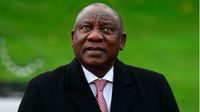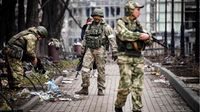The war between Israel and Palestinian group Hamas is set to hit Kenya with fresh economic pain as oil prices rise on concerns of a destabilised Middle East and the potential strengthening of the dollar against the shilling as investors run to the safe haven of the US economy.
The conflict, which broke out two weeks ago, is threatening to draw in more actors from the Middle East, which is the main source of Kenya’s fuel imports as well as a key export destination of food and animal products.
The effects of the war are thus likely to mirror those of the Russia-Ukraine conflict —which started in February 2022 — which resulted in higher global food and fuel prices and capital flight to the West.
Read: Speak out on disruptive Ukraine war
“The Israel-Hamas conflict will raise the price of oil just as the Russia-Ukraine war did. The players in this conflict, directly or indirectly, are oil producers and could use oil as a bargaining chip. Watch fuel prices next month,” said XN Iraki, a lecturer in economics at the University of Nairobi.
Since the start of hostilities on October 7, the price of Brent crude oil (the global benchmark) has jumped by 10.4 percent or $8.75 to $93.18 a barrel. Murban oil, from which Kenya’s petroleum imports are drawn, has in the period appreciated in price by 8.1 percent or $6.97 to $93.11 a barrel.
A rise in crude prices is set to pile upward pressure on pump prices in Kenya, which after the most recent review last week rose to an all-time high of Sh217.36 per litre of petrol and Sh205.47 for diesel in Nairobi.
The cost of fuel impacts heavily on inflation due to the movement of goods and services.
In the currency market, the dollar tends to gain against other currencies in times of crisis, since it is seen as a safe haven against inflation alongside precious metals such as gold.
Locally, a further weakening of the shilling against the dollar carries serious inflationary risk due to the country’s position as a net importer. In the past 12 months, the shilling has depreciated against the greenback by 19 percent, to exchange at 149.78 units as per the official rate published by the Central Bank of Kenya (CBK).
“Such turmoil also leads to investors seeking ‘safety’ in the dollar leading to its appreciation; and depreciation of our currency. A further rise in inflation is expected, given we are net importers and need dollars,” said Prof Iraki.
The conflict also risks disrupting trade with countries in the wider Middle East, which in 2022 absorbed Kenyan exports worth Sh84.96 billion.
The trade balance with the region is heavily skewed against Kenya, mainly due to petroleum purchases which accounted for a large share of the Sh612 billion imports from the Middle East in 2022.
Israel, for instance, exported Sh6.84 billion worth of goods to Kenya last year, while imports from Kenya stood at Sh978 million.
Any disruption to trade, likely accompanied by higher prices, would, therefore, force Kenya to fork out more, or incur the additional expense and effort of sourcing for other source markets.
For the financial markets, outflows of capital from frontier markets such as Kenya have tended to accelerate whenever there is a global crisis.
Inflationary pressure in the US and EU, which deepened after the Russia-Ukraine conflict started, has seen major central banks in these economies raise interest rates to between 4.0 and 5.25 percent, making them more attractive to investors compared to riskier, smaller markets.
As a result, markets such as the Nairobi Securities Exchange (NSE) have been hit by sustained foreign investor exits, hitting share prices of blue chip firms and contributing to a decline in investor wealth at the bourse by Sh530.4 billion this year.
“Higher global oil prospects would invite some inflationary pressures, which should prolong the tighter monetary cycle. That’s the context [under which] investors may sieve off the most vulnerable frontier economies from the resilient ones,” said Churchill Ogutu, an economist at IC Asset Managers (Mauritius).
This also affects the government when it is seeking to borrow from external commercial lenders, due to the elevated cost of loans.
Read: Kenyan imports from Russia, Ukraine hit Sh51bn
In the next eight months, the Treasury will need to raise $2 billion to retire the 10-year Eurobond floated in June 2024.
Ordinarily, the State would roll over the debt through the issuance of another Eurobond, but it has been unable to float one since June 2021 owing to the escalation of interest rates from early 2022 due to the Russia-Ukraine war. By CHARLES MWANIKI





